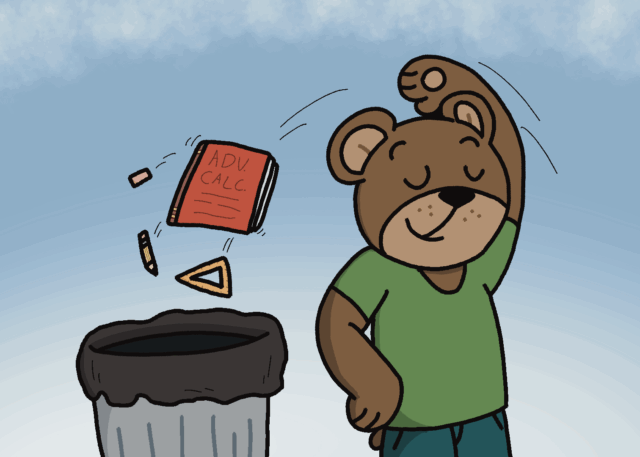By The Editorial Board
As a Baylor student, you probably have a collection of tabs on your computer that you switch between like clockwork. The first is perhaps your old faithful Spotify or Apple Music; the second is some sort of media site like Netflix or YouTube to cure study session boredom; the last is Bubooks.
Let’s be honest here, we’ve all sat down in a mysterious building during the first week of classes and thought, “this is not the class for me,” then promptly opened our handy Bubooks tab to look for the best alternative.
Maybe the teacher’s learning style wasn’t a good fit. Perhaps the class seemed too exam-heavy, or the lack of natural light made you feel claustrophobic. Whatever it was, we are here to assure you that feeling this way is completely normal.
In 2019, a study showed that 41% of students drop a class during their first two years at a four-year university. The majority of students reported three different reasons for their drop: not liking the course, not liking the instructor and being unsatisfied with their grade. This study also showed that “a student’s preparedness is not a driver of course dropping,” showcasing that academic inclination is not as important as we think.
While there is a small window of time available to drop classes without a withdrawal and acquire a “W” on your transcript, the implications of this are still minute. The “W” on transcripts does not affect your GPA, and you’re able to retake the course at a different time period.
The truth is that switching or dropping a class, regardless of the reason, doesn’t make you a failure, and recognizing when something isn’t for you is vital to your success. While some might think there needs to be a valid excuse for dropping a class, if it doesn’t feel right to you, then you are completely justified in finding a more productive way to spend your time.
Think of your classes like a charcuterie board. Some prefer a minimalist lineup, while others enjoy a full variety of options. The beautiful thing about life is that you have autonomy over these decisions — one of those choices being your academic recipe.
Forcing yourself to stay in a class that you know you won’t succeed in or that you won’t enjoy is an ego-driven act of self-sabotage. There are always the pesky general courses that are required to graduate; however, if those classes are keeping you up at night and taking a toll on your mental health, then it’s not worth it to prioritize your mental health over a class that’s going to destroy it. There is always an option to take the class at a different time with different professors.
Ultimately, it’s essential to understand you will have a much harder time being successful in a class that doesn’t fit right for you, rather than one that piques your interest. And know, you’re not alone in this.
Developing academic confidence and trust in yourself is crucial for knowing when a class is right for you or not. Everyone’s brain works differently, and whether or not you can pass a class is oftentimes connected to your learning style and interests rather than your intelligence level. Dropping a class doesn’t make you dumb; it makes you intentional.
Just because the person sitting next to you seems to be able to understand classical conditioning in your intro to psych class at lightning speed doesn’t mean they are better or more worthy than you. We are all naturally inclined towards something, and academic comprehension is not something we need to tie our worth to.
So go forth, be fearless in your pursuit of finding classes you enjoy. Don’t let any insecurity or fear of failure stop you.




